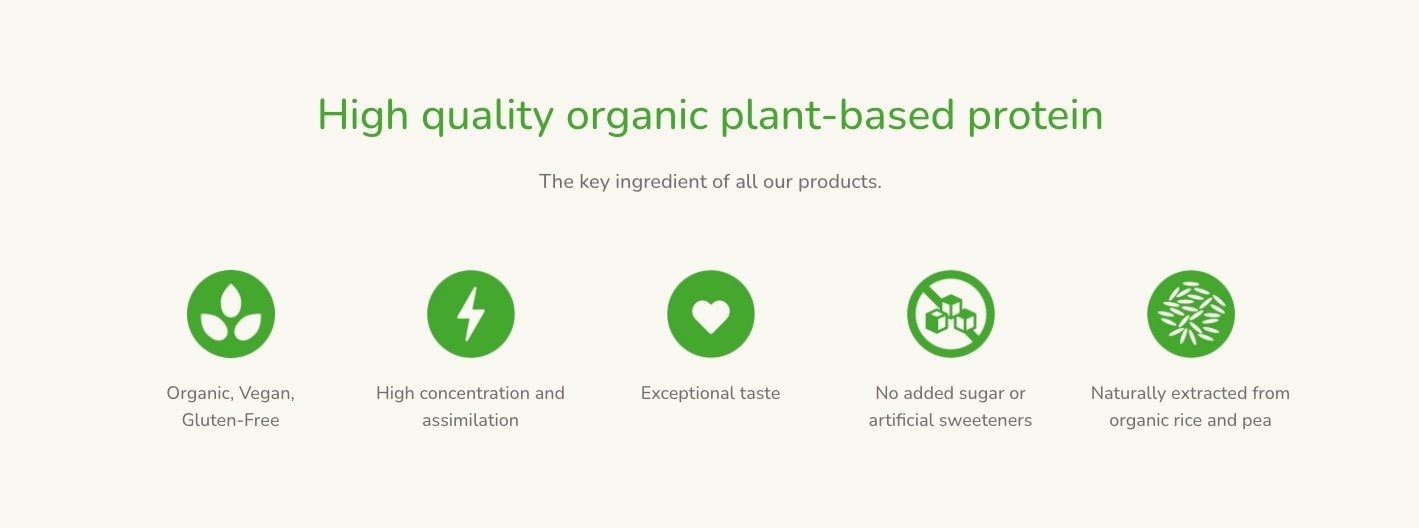Plant based proteins: the food of tomorrow?
Whether for environmental, ethical, economic or health reasons, plant-based food has more and more followers.
Plant based proteins are taking up more and more space on grocery shelves, so much so that in 2021, sales of plant protein products increased twice as much as sales of all other categories combined.
According to a 2018 Dalhousie University study, 6.4 million Canadians have a diet that limits or eliminates meat. In addition, a recent Deloitte survey reveals that “44% of consumers surveyed say they have tried to eat less meat in the past year” and that 72% report “an increase in meat purchases”. alternatives to meat
Indeed, there are more and more vegetarian or vegan alternatives to meat products, such as “fake” meat, deli meats and vege-chicken. California-based company Beyond Meat demonstrated a few years ago that the mass commercialization of vegetable proteins was possible, with its “fake ground beef”, and more recently with the “fake chicken”. In addition to the animal protein vs. vegetable protein debate, we have the right to ask ourselves whether these alternatives are really better for your health.
What are the health benefits of a vegetarian/vegan diet?
A diet based on plant-based foods has health benefits. It is generally higher in fiber and lower in saturated fat and cholesterol than a diet that includes more animal products. A diet rich in plants can help prevent the development of certain diseases, such as cardiovascular disease, cancer, type 2 diabetes, overweight and obesity.
Are vegetarian/vegan alternatives healthy?
Choosing vegetarian/vegan alternatives is not necessarily healthier than choosing a meat-based diet. That is why the choice of quality ingredients is so important

“The American fast-food chain KFC © will test meatless nuggets.”
Twitter @kfc
Indeed, the list of ingredients of these plant-based alternatives is often longer and may contain additives, flavorings and colorings as well as higher amounts of sodium, sugars and lipids. These vegetarian/vegan products may also contain less protein than meat products. However, meat alternatives can provide more fiber, thanks to the presence of vegetable proteins.
It is therefore important to carefully read the list of ingredients and check the Nutrition Facts table to make an informed choice. The mere fact that a product is identified as “vegetarian” or “vegan” does not mean that it is healthier
Adding plant based protein to your diet therefore has health benefits, but not if you regularly opt for highly processed alternatives, which are often saltier, fattier and sweeter than meat products.

Why choosing “high quality plant based proteins” is so important for your health?
Be careful when choosing your source of proteins because many can contain artificial ingredients that can be potentially harmful for your health… And sometimes it is difficult to choose when you don’t have the good criteria.
At Nature Zen, we offer you highly quality proteins, developed with quality in mind (and certified organic ingredients from A to Z) to be sure that your body receives all it needs to keep you healthy
If you want to reduce your meat consumption, it is better to turn more often to products that are little or not processed, by opting for vegetable proteins, such as nuts, seeds, legumes (e.g. white beans , chickpeas, lentils), textured vegetable protein (TVP), tofu, edamame, seitan (not for celiacs or gluten intolerants) and tempeh, in order to benefit from the advantages of a vegetarian or vegan diet.

And what revolution can we expect in the not so distant future?
Have you ever heard of cellular agriculture?
Several billion dollars have already been poured into research projects related to plant proteins, towards what looks like a nice mix of agriculture and medicine. In Canada, 13 research projects are already underway, and companies estimate that by 2040-2050, around 60% of the protein market should come from cellular agriculture.
What alternatives to meat?
As Sylvain Charlebois, Senior Director of the Agrifood Analytical Sciences Laboratory at Dalhousie University, puts it:
“Cellular agriculture that eliminates animal exploitation has the potential to change the way we feed the 9 billion people we will have on the planet by 2050. Tailored foods, complemented by better orchestrated production, at sheltered from climatic scourges, offering more stable prices are within our reach. »
Imagine… milk, beef, all without cows, eggs and chicken, without hens!
There will be disputes, disagreements and discussions. This will not be unanimous, on the one hand for producers of beef, milk and eggs, as well as among purists. But, it must be clear that science will bring us solutions where a short time ago we would not even have imagined finding any!
At Nature Zen… we bring the healthy food of the future accessible now!
Sources:
- https://www.lapresse.ca/debats/opinions/2022-02-10/proteines/une-troisieme-revolution-a-nos-portes.php
- https://nutrition.umontreal.ca/wp-content/uploads/sites/45/2019/11/Viens-manger_v%C3%A9g%C3%A9tarisme.pdf
- https://www.statcan.gc.ca/eng/help/collection#a7
- https://www2.deloitte.com/ca/en/pages/consumer-business/articles/future-of-food-a-canadian-perspective.html











